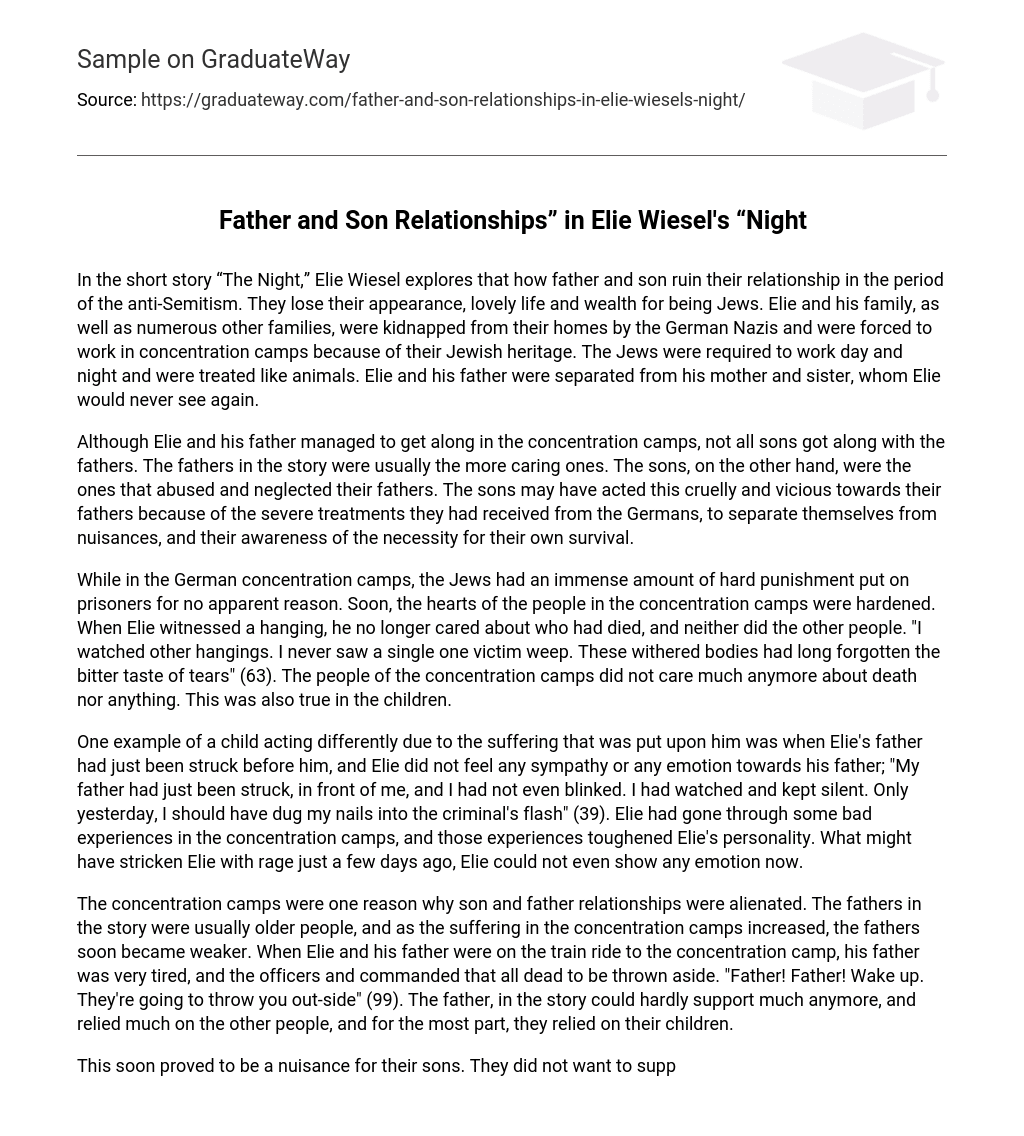Elie Wiesel’s “The Night” delves into the deterioration of the father-son relationship amidst pervasive anti-Semitism. The protagonist and his family, along with countless others, were forcibly displaced from their residences by German Nazis due to their Jewish background. As a result, they experienced oppression as captives in concentration camps, forfeiting their possessions and enduring severe conditions. Sadly, Elie and his father were tragically torn apart from his mother and sister, forever severing their bond.
While Elie and his father maintained a positive relationship during their time in the concentration camps, other sons did not have the same experience with their fathers. Overall, the story portrays fathers who were caring but often mistreated and ignored by their sons. This behavior can be attributed to the harsh treatment inflicted by the Germans, the desire to distance themselves from responsibilities, and an understanding of the need for self-preservation.
While in German concentration camps, the Jews suffered harsh punishment without apparent reason, causing their hearts to become hardened. Elie and his fellow inmates became desensitized to death after witnessing hangings. In Elie’s words, “I observed other hangings. Not one prisoner wept. These emaciated bodies had long forgotten the taste of tears” (63). This indifference extended to death and all aspects of life, even towards children.
One example of a child responding differently to suffering is when Elie’s father is struck in front of him and Elie feels no sympathy or emotion towards him. Elie explains, “My father had just been struck, in front of me, and I had not even blinked. I had watched and kept silent. Only yesterday, I should have dug my nails into the criminal’s flash” (39). Elie’s time in the concentration camps has hardened his personality, causing him to be unaffected by what would have previously enraged him.
The alienation between son and father relationships was partly due to the existence of concentration camps. In the story, the fathers tended to be older individuals who grew weaker as the suffering in the camps intensified. During their train journey to a concentration camp, Elie’s father was extremely exhausted and the officers directed that the deceased be discarded. Elie urgently woke his father up, exclaiming, “Father! Father! Wake up. They’re going to throw you outside” (99). The father’s physical condition deteriorated to the point where he could hardly manage on his own and increasingly relied on others, particularly their children.
This soon became inconvenient for their sons as they did not wish to assist their weak and elderly fathers. The time spent helping their fathers could have been used for other purposes. An instance where a son distanced himself from his father due to the father’s annoyance is evident in Rabbi Eliahou’s son abandoning him. While running to a camp, the Rabbi began falling behind, and upon noticing this, his son did not halt or reduce his pace. “A troubling idea entered my thoughts: What if he desired to be free from his father?”
The son observed his father’s weakening physical state and anticipated his impending death. Recognizing that staying close to his father would hinder his own chances of survival, the son chose to distance himself from him. This was a factor contributing to the son’s harsh treatment towards his father. In the book Night, the characters were left without support and had no choice but to resort to violence, including hurting and killing others, in order to secure their own survival.
Within this context, the text depicts an incident involving sons and fathers. While Elie was traveling on a train passing through a village, some individuals aboard the train were hurling food towards the starving inhabitants of the village. This action sparked a massive commotion among the people who were desperately seeking food that was scarce. During this chaos, Elie witnessed a man attempting to discreetly obtain some bread, but his son intervened. The son addressed his father as “Meir,” pleading for recognition and exclaiming how he was unintentionally causing harm to him by trying to acquire bread for both of them. Tragically, in their struggle over the bread, the son inadvertently caused his own father’s demise. Consequently, this heartbreaking event severed the once unbreakable bond between fathers and sons.
The sons in the story “Night” have become independent men, viewing their fathers as obstacles in their path to survival. They act harshly, and at times violently, towards their fathers. No longer seeing them as caregivers, the sons perceive their fathers as having no more power than they do. To the sons, their fathers are now just regular strangers who hinder their progress. This illustrates a common aspect of human nature – when faced with trials and tribulations, individuals may disconnect themselves from everything except for their own selves.





